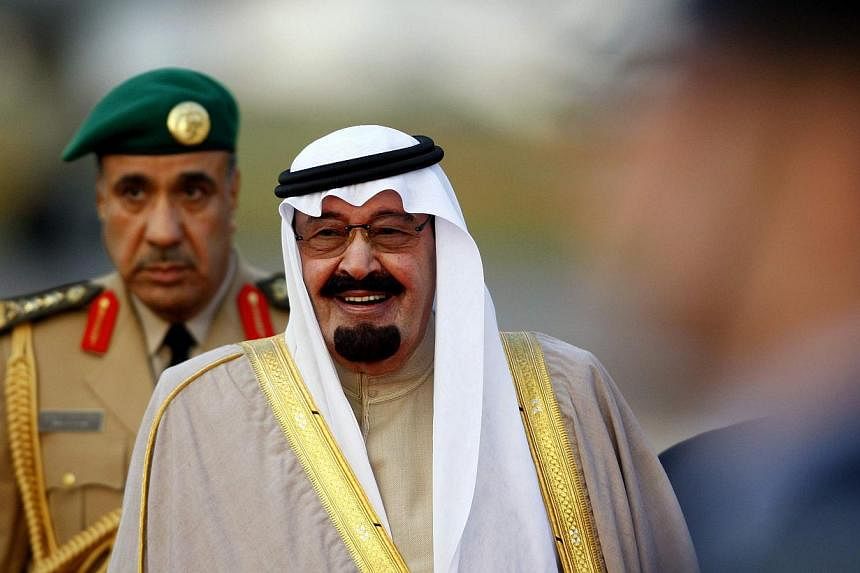SINGAPORE (AFP) - Oil prices surged Friday following the death of Saudi Arabia's King Abdullah, with investors watching to see if the country will change its policy of maintaining high production in the face of plunging prices and a global supply glut.
US benchmark West Texas Intermediate (WTI) for March delivery soared as much as 3.1 per cent in New York after the Saudi royal court announced the death.
In early morning Asian trade, the contract was up 73 cents, or 1.58 per cent, at US$47.04 a barrel.
Brent crude for March jumped US$1.09, or 2.25 per cent, to US$49.61.
The surge in prices comes after months of steep falls caused by weak global demand, an oversupply of the black gold and a refusal by the OPEC cartel, of which Saudi Arabia is a key member, to cut down on output.
"The market is probably uncertain over what the new king would do about this over supply issue," said Daniel Ang, an investment analyst with Phillip Futures in Singapore.
"The market was just pricing this uncertainty," he told AFP.
King Abdullah bin Abdulaziz died on Friday and was replaced by Crown Prince Salman, the royal court said in a statement.
Analysts said focus will turn to whether Salman, 79, keeps Ali al-Naimi as the country's oil minister since 1995.
"The Saudi leadership has already taken the tough decision to live with lower oil prices," Florence Eid-Oakden, chief economist at London-based consultants Arabia Monitor, said by phone.
"Naimi is well established, he is respected and there shouldn't be a change as long as the current cabinet is in place," she told Bloomberg News.
Saudi is the main producer in the Organization of the Petroleum Exporting Countries (OPEC) whose decision in late November not to cut production levels despite a supply glut accelerated the fall in oil prices.
OPEC's 12 members, which supply about 40 per cent of the world's oil, kept their combined output target at 30 million barrels a day during a November 27 meeting.
Saudi Arabia has rejected calls from some members to slash output, preferring instead to lower prices in a bid to gain market share.
Oil prices have lost more than half their value since June, when they were sitting at more than US$100 a barrel.
The late monarch's half brother Moqren was named crown prince, according to the royal court statement.
King Abdullah, believed to be around 90 years old, was hospitalised in December suffering from pneumonia and had been breathing with the aid of a tube.
He died on Friday at 1:00 am (2200 GMT) and will be buried later in the day following afternoon prayers, said the statement.
In recent years, his advanced age and poor health had raised concerns about the future leadership of one of the world's key oil producers.
Salman was named crown prince in June 2012 following the death of Prince Nayef bin Abdulaziz.
Salman had been representing the king at most recent public events because of the monarch's poor health.
In March 2014, King Abdullah named his half-brother Prince Moqren as a second crown prince, in an unprecedented move aimed at smoothing succession hurdles.
Since the death in 1952 of King Abdulaziz al-Saud, the founder of Saudi Arabia, the throne has systematically passed from one of his sons to another.
But many of them are old or have died. The former crown princes Sultan and Nayef died in 2011 and 2012 respectively.

